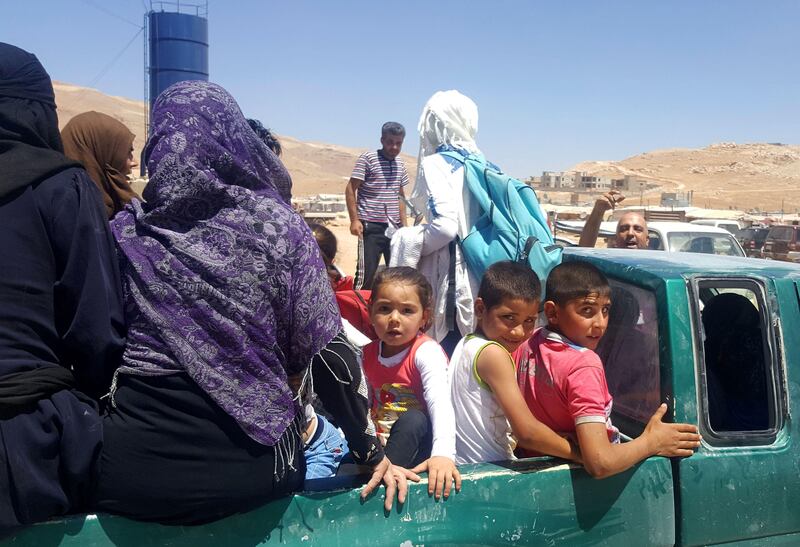Thousands of Syrian refugees living in northern Lebanon began returning by bus to Syria on Wednesday, signalling a shift in Lebanese government policy.
As many as 10,000 Syrian militants and civilians are expected to return to different parts of the country from the area around the northern Lebanese town of Arsal as part of a ceasefire deal to end fighting between Hizbollah and Jabhat Fatah Al Sham — a former Al Qaeda affiliate.
The Lebanese government has until now taken the position that any refugee returns to Syria should be co-ordinated with the United Nations, which has registered more than one million Syrian refugees across Lebanon.
The transfer marks a grim milestone in the Syrian refugee crisis which has seen more than 5 million people flee the country. The agreement to send many of the civilians to the northwestern Syrian province of Idlib, which is largely under the control of Fatah Al Sham and affiliated militants, has raised concerns that they are being sent back into harm's way.
“We will only address this issue in close co-ordination … with the UN and its specialised agencies,” Lebanese prime minister Saad Hariri said last month in a meeting with other officials, including UN Special Coordinator for Lebanon Sigrid Kaag. “We will make sure that the conditions for their return are properly met and in accordance with international law.”
UN High Commissioner for Refugees spokeswoman Lisa Abu Khaled said the UNHCR had no role in negotiations or the transfer of refugees, adding that it was seeking access to the area where the refugees were located.
She said the agency did not know if any of the refugees returning to Syria had been registered.
“We have received no official request from any side to be involved,” Ms Abu Khaled said.
Hizbollah’s “War Media” outlet reported at least 66 buses had prepared to leave on Wednesday and were expected to carry fighters and civilians to Flita on the Syrian side of the border.
___________
Read more:
[ Nearly 8,000 Al Nusra militants, refugees leave Lebanon to Syria ]
[ Sides exchange bodies after truce on Lebanon-Syria border ]
___________
Smaller groups of refugees have returned to Syria recently as part of locally brokered deals, but none have approached this size.
The returns are part of a deal that follows a Hizbollah offensive around Arsal to flush out Fatah Al Sham fighters — who have been using the area as a hideout for several years.
According to Hizbollah, after almost a week of fighting, Fatah Al Sham fighters withdrew to refugee camps which were then surrounded by Hizbollah militants, prompting negotiations begin between the two groups.
Hizbollah media reported that more than 100 Fatah Al Sham militants and 27 Hizbollah fighters were killed.
The returns stalled briefly on Tuesday due to negotiations over exchanging prisoners as part of the deal, but by Wednesday morning the issue had been resolved with the facilitation of the Lebanese General Security, reportedly with Mr Hariri’s approval.
Ms Abou Khaled said the UNHCR was still not ready to advocate for refugees to be returned to Syria.
“We believe conditions are not yet conducive for a safe return for refugees to Syria,” she said. “There should be safety and safeguards for refugees.”
“Refugee returns need to be an individual decision, and this decision should be made free from any undue pressure.
“We would be concerned about them understanding the conditions they are returning to.”
Many of the refugees will be sent to Idlib where Fatah Al Sham continues to fight the Syrian government and has been the target of aerial bombing by Russia and the United States. It has also clashed with other anti-government Syrian militants in the area and been accused of human rights violations.
“Areas that are safe today may no longer be safe tomorrow, and we’ve seen that a lot in Syria,” Ms Abou Khaled said. “The first returnees in any situation are very important, because they will give other refugees the confidence to consider return.”
Randa Slim, the director of the Track II Dialogues initiative at The Middle East Institute in Washington, said: “They are going back to a region that is likely to be targeted in the future by the Syrian regime as happened in Aleppo.”
The UNHCR says that of the estimated US$463 million (Dh1.7bn) it needs to provide basic assistance to refugees in Lebanon for 2017, only about $162 million had been received from donor countries as of July 3.
At the request of the Lebanese government, UNHCR also stopped registering new Syrian refugees in the country in 2015. Some estimates put the number of Syrian refugees in the country closer to 1.5 million.
“In general, Lebanese public opinion supports a policy of returning as many if not most of the Syrian refugees to their country of origin. The Lebanese government is partly responding to this shift,” Ms Slim said.
“And partly it is responding to a growing realisation that the Syrian regime is not going to fall anytime soon and that linking the return of refugees to that development is no longer realistic.”
* Additional reporting by Reuters





